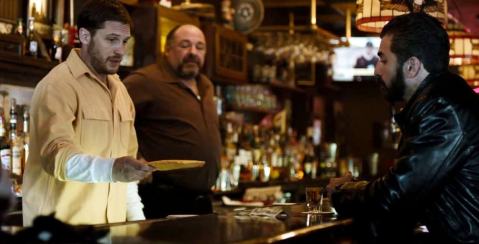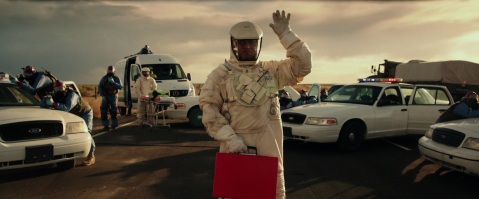Review: Passion
Year: 2012
Certificate: 15
Director: Brian De Palma
Screenwriter: Brian De Palma
Cast: Rachel McAdams, Noomi Rapace, Karoline Herfurth, Paul Anderson

Passion charts the toxic relationship of predatory advertising executive Christine (Rachel McAdams) and her shy but sharp subordinate Isabelle (Noomi Rapace). As their amicable dynamic gradually becomes poisoned by jealousy, betrayal and ambition both professional and personal, Isabelle finds herself accused of a terrible crime.
An English-language remake of 2010’s Love Crime, De Palma weaves a well-made if irredeemably pulpy tale of executive backbiting. Saturated in bright colours, dark shadows and consecutive Dutch angles, the cinematography reflects the heightened nature of the connection between Christine and Isabelle, by turns erotically charged, heady and- ultimately- deadly. McAdams is on top form here, although her casting has an unfortunate side effect of framing the film as an almost-plausible ‘10 years on’ scenario for her poisonous teen diva Regina George from 2004’s Mean Girls. Similar to George, Christine is a committed life-ruiner, her charming facade hiding an impressively sadistic personality. Rapace also excels playing the apparent ingénue who comes to take her role as Christine’s protégée perhaps more literally than Christine intended.
Riffing heavily on the connection between professional ambition and romantic desire, De Palma perhaps oversteps the mark a little, ultimately coming off more schlocky than sinister. The much trailed girl-on-girl eroticism is aimed squarely at a hetero male audience, and the framing of the career ambitions of its female characters as cut-throat, two-faced and irrevocably intertwined with their sexuality betrays an ambivalence towards women that feels at best old-fashioned.
Verdict: 2/5
Image credit: imdb.com
The Drop DVD Review
Gandolfini Final Hustle
Released : November 14th 2014
Certificate : 15
Director : Michaël R. Roskam
Cast : Tom Hardy, James Gandolfini, Noomi Rapace
Plot : A bar in New York is run by Marv (Gandolfini) and cousin Bob Saginowski (Hardy), who both look the other way as local mobsters use the pub as a drop off for cash. The two routinely help the money change hands within the bar, until one night their robbed for five thousands, placing them in deep with the mobsters.

World class television series and film actor James Gandolfini last film is released after his untimely death. Gandolfini granted will not be remembered for his film performances as much as his Golden Globe winning iconic role in The Sopranos as Tony Soprano, a family man who is forced to juggle home life as well as his involvement with the mob. Hence Gandolfini is pitch perfect type cast for The Drop, a small crime thriller about cousins who run a bar in New York for the mob. The film tackles issues such as family ties, past glory, desperation and neighbourhood history, all wrapped up in a simple small story with complexity and character count alike that of A History of Violence or Drive. Meaning a film dealing with crime, but with more subtlety and scope than many of cinemas greatest crime outings, this doesn’t mean that less is more within the genre, but historically it hasn’t been the case. With these sorts of films comes a higher level of investment in character, as the film doesn’t have as many guns blazing to distract audiences. For this film we have Tom Hardy’s lead as a quiet bartender who has a simple monotonous routine, and Gandolfini the manager of the bar who is frustrated by his position after former local fame.
Speaking on the topic of less being more, The Drop rides this waves throughout the whole narrative, relying on subtle metaphoric character interactions and lines hidden in a story that has little substance or weight. The film attempts to take a look at what its likely for the small timers or the ones beaten down by the bigger mob bosses, which is a good enough fairly unexplored premises. But the film lacked from very little in the ways of actual entertainment value to keep the audience on board for the poignant story to develop. There is some light and enjoyment to be derived from this gloomy thriller, such as a general likeability factor of Hardy’s simple bar tender character a few violent thrills as the plot develops, and the main selling point Hardy’s character discovery of abandoned pub and their friendship. But for many these comfort pleasures of the film will not be able to endure the rather dry and limited script which may be effective to creating believable characters, but not in dialogue that will hook audiences or provided stirring lines.
Other aspect such as directing did have their sparks of originality but few and far between. There is particular good handling of the final scene within the bar with unexpected camera work (due to dress up until this point) of a camera flip to follow the money exchanging hands, and also the overall building of suspense within the bar in the final act does bring about a level of tense atmosphere. But perhaps due to lack of experience that Roskam has, there is very little else brought to the directorial scene. There are attempts in directing, as with he story itself, to be more metaphorical and artistic than it really is, for example an opening cliché shot showing the bar through a reflection in a puddle. It could be argued that its plain presentation is purposeful in order to suit the mood of the film and clearly present the character driven drama of the film, and with little action, these no opportunity for flexing of directing muscles. But close up shots and over the shoulder shots wear thin when the dialogue on-screen isn’t enough alone to hook audience. Overall whatever the reason, Roskam work wasn’t anything memorable.
Now for the aspects of the film that were note worthy, that being the work of Hardy, Gandolfini and Rapace. Hardy’s character in this is far more subtle than many of his other roles, but that doesn’t make it any less hooking. The likeability factor of Hardy’s simple humble bar tender is the best part of this film, the characters written persona while being quiet and recluse is a needed presence as an average joy good guy within the story. Hardy delivers him in a plain and threatened nervous manner in the film, which makes you route for him all the more in the film, it ticks the box of what all protagonist should do, you care about what happens to him. Gandolfini work is brilliantly type cast for the character type, and fits the uncontempt angry manager like a glove, with particular flexing of acting muscles towards the ending of the film via some more emotional scenes of the film. While both performances are entertaining enough, the same cannot be said for the source material, even though Hardy has little to say. The dialogue was attempting to be too high reaching or poignant that it really is, but the characters created by script was solid.
The Drop is an attempt at a crime thriller driven by small cast character drama, and it has some of the components to do so. It contains written characters that are entertaining enough with actors which handled them well, but due to the overall dialogue that isn’t stirring as well as an old story, the characters can’t keep the film afloat. Ultimately the short run time of an hour and three-quarters drags, in a crime film, a genre that is definitive for its thrilling nature. While there is some enjoyment to be derived from the little story of Bob and his dog (he finds in a bin leading to a friendship with Noomi Rapace character) that make you invested in the character, it’s a recreation of a worn out ‘find my money’ story which is lacking in the necessary drive as far as twists and turns (which aren’t predictable) married with a script of intelligence that can left the film out of the gritty cold world it is set in.
Verdict : You might like a story of a bar tender and his dog, trying to make the best of it, as that undoubtedly tugs on heart-strings. Unfortunately it isn’t a unique, or even adequate, take on crime drama to do Gandolfini or Hardy work justice, there just needed to be more substance as far as story and script.
Verdict : 2/5
Quote : “But it didn’t, it was just a stool.”
Review: The Signal
Released: 27th March
Certificate: 15
Director: William Eubank
Screenwriter: Carlyle Eubank, William Eubank, David Frigerio
Cast: Brenton Thwaites, Olivia Cooke, Beau Knapp, Lawrence Fishburne
So far, 2015 appears to be the year for left-field sci-fi, with releases such as Ex Machina and Predestination bringing fresh and interesting takes on well-worn genre tropes. Unfortunately The Signal, despite its indie trappings, has neither the impact nor the excitement of the aforementioned films. Nic (Brenton Thwaites) is an MIT student and hobbyist hacker struggling with a recent diagnosis of an ALS-like (but unnamed) condition. While driving his girlfriend Haley (Olivia Cooke) across the country to Caltech in the company of their best friend Jonah (Beau Knapp), they take a detour in an attempt to ambush mysterious hacker Nomad, with whom they have a score to settle. One uncanny encounter later, Nic wakes up in a secret government facility where he finds himself being debriefed after an extra-terrestrial encounter, of which he has no memory, by the hazmat-suited Dr Damon (Laurence Fishburne).
While the individual sequences are undeniably atmospheric and, when required, creepy, The Signal is a case of style over substance. In the initial setup the characters are too roughly sketched, and not particularly likeable, lowering the stakes of their sequestration. More unforgivably, Haley is relegated to the sexist clichés of being the nagging girlfriend before their encounter with Nomad and the comatose motivation for the hero to fight back after it, and is clumsily sidelined in the denouement to make way for the actions of the principal male characters. Although there are some interesting concepts at play such as safety at the expense of personal agency, how humans react in the face of the inexplicable, and just who needs to be protected from whom, the execution does not produce a compelling synthesis of these ideas, instead devoting its energy to mood-building imagery for which there is no payoff.
Verdict: 2/5
Image credit: focusfeatures.com
Recent Posts
Archives
- September 2017
- February 2017
- January 2017
- November 2016
- October 2016
- September 2016
- June 2016
- April 2016
- March 2016
- February 2016
- January 2016
- December 2015
- November 2015
- October 2015
- September 2015
- August 2015
- July 2015
- June 2015
- May 2015
- April 2015
- March 2015
- February 2015
- January 2015
- December 2014
- November 2014
- October 2014
- September 2014
- August 2014
- July 2014
- June 2014
- May 2014
- April 2014
- March 2014
- February 2014
- January 2014
- December 2013
- November 2013
- October 2013
Categories
- 1961
- 1982
- 1985
- 2010
- 2011
- 2012
- 2013
- 2014
- 2015
- 2016
- 2017
- 2D
- 3D
- Cinema
- Classic Reviews
- Collections
- DVD
- films
- Genre: action
- Genre: animation
- Genre: biopic
- Genre: comedy
- Genre: drama
- Genre: fantasy
- Genre: horror
- Genre: LGBTQ
- Genre: musical
- Genre: period drama
- Genre: sci-fi
- Genre: superheroes
- Genre: thriller
- Genre: western
- Netflix
- Preview Article
- Rating: 1/5
- Rating: 2/5
- Rating: 3/5
- Rating: 4/5
- Rating: 5/5
- Reviewed by: AES
- Reviewed by: SO
- Reviews
- Top 5 List
- Uncategorized

Recent Comments